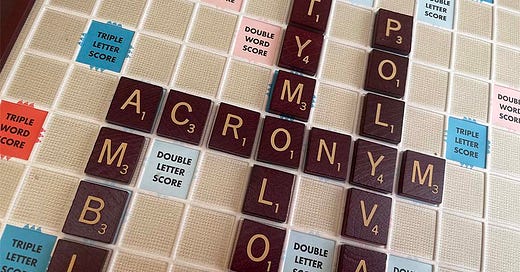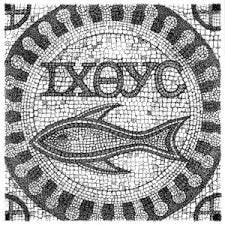When is an acronym not an acronym?
[the long and the short of acronyms, backronyms, initialisms, and various addenda]
When I think of acronyms, I think first of all of the words by which I was introduced to the concept as a boy: words like laser, scuba, and sonar. These are words formed as abbreviations of phrases—often jargony phrases like “light amplification by stimulated emission of radiation” (laser), “self-contained underwater breathing apparatus” (scuba), and “sound navigation and ranging” (sonar).1
Such acronyms are pronounced phonetically and written in normal sentence case, so that users may not always realize, or be conscious of, their abbreviation-based origins. Other abbreviations flaunt their initial-based status—either phonetically, orthographically, or both.
For example, GPS, RPM, DVD, and DYI are written in all caps and pronounced, not phonetically, but, let us say, initialistically, with the names of the letters pronounced individually.
There are also middle cases: notably, abbreviations like NASA and NATO that are pronounced phonetically but written in all caps.2
Finally, terms that are written in sentence case but pronounced initialistically are rare, but most often found in texting slang: for example, btw, lol, jk, idk.3
Some sources restrict the term “acronym” to those terms that are pronounced phonetically, like laser, while labeling terms like GPS and btw “initialisms” or simply “abbreviations.” In this schema, MAC for “money access machine” qualifies as an acronym, while ATM would be an initialism. This, though, is controversial, as the word “acronym” is widely used more broadly to refer to both types of abbreviations. Anyway, there are ambiguous cases that don’t fit neatly into either category! Consider:
The last three letters of CD-ROM and JPEG are pronounced phonetically, but the letters before that (the “CD” and the “J”) are pronounced as their names.
Some abbreviations originally pronounced initialistically later came to be pronounced phonetically, like “personal identification number, or P.I.N.”, becoming a one-syllable PIN and then finally the redundant PIN number.
That process of “phoneticization” is probably more common than the reverse, but the latter does happen: UFO was originally pronounced “you-foe,” but this was very quickly buried by the initialized pronunciation universally used today.4
A special case involves acronyms contrived to spell words that already exist, like the Marvel Comics spy organization S.H.I.E.L.D., or the ancient Christian ichthys (ἸΧΘΥΣ) code, in which the initials of the Greek words “Jesus Christ, Son of God, savior” (Ἰησοῦς Χριστὸς Θεοῦ Υἱὸς Σωτήρ) spell out the Greek word for fish (ἰχθύς), from which we get “ichthyology”).
Such meaningful acronyms-by-design are sometimes called acrostics or backronyms.
These can be contrived or nominal (e.g., the PATRIOT Act or USA PATRIOT Act, ostensibly standing for “Uniting and Strengthening America by Providing something something”);
more felicitous (the DREAM Act, explained as “Development, Relief, and Education for Alien Minors”); or
possibly even serendipitous (SAD, “seasonal affective disorder”).5
There are also mnemonic backronyms that are barely words at all, in the sense that they are hardly if ever used in an sentence in ordinary conversation, like KISS (“keep it simple, stupid”) and DRY (“don’t repeat yourself”).
Personally, I tend to call ’em all “acronyms.” Initializations and backronyms for me are subsets of acronyms, not something else. But I don’t count transparently fake acronyms, like K9, or folk-etymology/urban-legend “acronyms,” like “port out, starboard home” for posh.6 You gotta draw the line somewhere!7 Also, AM/PM and BC/AD are just abbreviations.
Others are … less jargony, like snafu (“situation normal, all f***ed up”), fubar (“f***ed up beyond all recognition/repair/reason”), and fubb (“f***ed up beyond belief”).
Such terms are often, though not always, organization names; non-organizational examples include GOAT and YOLO (respectively, “greatest of all time” and “you only live once”).
When not pronounced initialistically, these terms may be pronounced as the words they represent in full; thus idk is pronounced “I don’t know.” A few, like lol, may be pronounced phonetically.
Only the name of the field of “ufology” preserves a memory of the original name—when it’s not pronounced “U.F.Ology”!
Sometimes, too, they don’t quite spell out the word they seem intended to suggest (e.g., MADD for “Mothers Against Drunk Driving,” which is at least backronym-adjacent, perhaps serendipitously so).
Perhaps the most surprising folk-etymology “acronym” is SOS, which doesn’t stand for anything at all, particularly including “save our ship/souls.”
Drawing lines isn’t always easy! I want to exclude abbreviations based on not just the initial letters of the formative words, but somewhat longer bits like syllables, as “Benelux” for Belgium, the Netherlands, and Luxembourg. That seems to me to stretch the concept of an acronym toward the different concept of a portmanteau! On the other hand, even sonar (“sound navigation and ranging”) takes the first two letters of “sound” and perhaps of “navigation” (though the a could also represent the “and”). So. Where do you draw the line?







Interestingly, LOL is both pronounced initialistically and as a word, lawl, with slight differences in the connotation.
SOS is because of being memorable in Morse code as dot dot dot dash dash dash dot dot dot. (Which I expect you already knew.) Two occasions when I've been alerted to distressed people on mountains, one was SOS as morse flashes, the other was the three letters shouted.
Could also cite MAD for mutually assured destruction in Cold War, the doctrine that both sides had enough nuclear weapons to destroy the other even after receiving a full force attack. And the Belgian author Hergé (Tintin books) whose pseudonym is a backwards acronym from the letters R G pronounced in French.